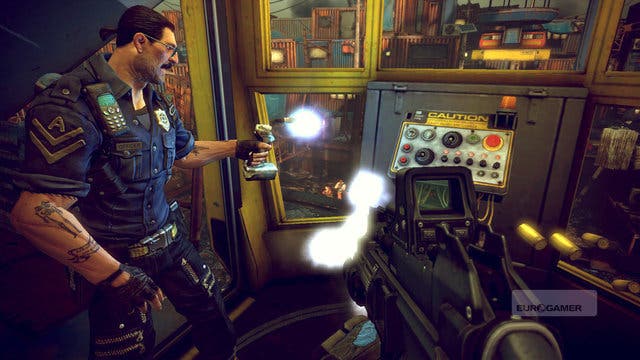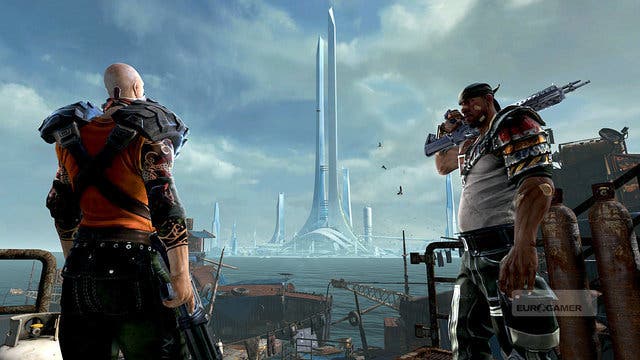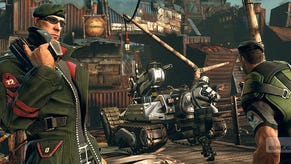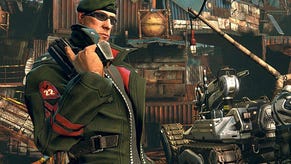Brink
Gun running.
It's always clear where your current primary objective is, and you can move through the (primarily indoor) environments either by taking the corridors and staircases or, if you hold down the L-bumper, free-running up columns and hauling yourself onto ledges. Holding up on the d-pad brings up a radial interface listing your current objectives, and you can pick the one you want the chase, your character shouting your intention to team-mates without anyone needing to use the mic.
It is, rather obviously, imperative that you work as a team. In a match between two teams of eight humans, the side that moves as a team rather than a loose collection of individuals will effortlessly overpower its rival.
One core difference to the majority of squad shooters is Brink's RPG character development. Every positive action in the game is rewarded with experience points. On levelling up, you're awarded credits, which can be spent on a variety of performance-enhancing abilities.
The majority of these enhancements are modest or specialised, such as shooting a grenade while it's in the air, or scavenging equipment from downed enemies. Where there's a more serious upgrade, it comes with a counterbalance; learning to fire your secondary weapon while incapacitated reduces the amount of 'downed' health you have, for example. A few abilities, like the Engineer's capacity to erect auto-targeting defence turrets, are critical upgrades that can turn the course of a match. But on the whole, the RPG metagame has been skilfully designed so as not to upset balance.

The campaign tells two stories: that of the Ark's Security forces trying to bring order to the city and that of the Resistance, a group of disgruntled residents hoping to flee it. There's no room for narrative flourish within the missions themselves, which are so intently focused on game mechanics that cut-scenes would irritate rather than enrich. Instead, the story is told entirely through optional intro scenes and fails to gain much of a foothold in the mind.
The campaign is a slim package, with just six missions assigned to each faction and two bonus 'What If?' missions for each side. In many cases, the missions on each side mirror one another, which can leave you feeling somewhat short-changed when both sets are complete.
You get additional content in the form of four challenge rooms. Each of these introduces a different aspect of the game: one for objectives, one for free-running, one in which you must escort and protect a repair robot, and a tower defence stage in which you play as the engineer laying turrets to fend off waves of attackers. Each challenge has three levels of difficulty. It's a strong area of the game that feels a little under-developed, and a more comprehensive set of challenges would have been welcome.
Likewise, there's some concern that Brink will fail to provide ongoing incentives over the long haul. It's telling that the achievement for developing a character to Rank 5 is titled "Time to start a new character". It won't take too long to max out one character's abilities, leaving you with the sense that you've 'won' everything the game has to offer.

Of course, the idea is that you continue to play the game competitively online for its own sake as the months roll past. But any title that introduces an XP system as its core economy sets up the expectation that there is an eventual endgame, and Brink's extrinsic rewards dry up too soon.
A free play mode allows you to set up your own bespoke matches across any of the eight maps in the game, playing objective or time-based games with a variety of options to tailor the set-up to your own taste. Online, you can only ever play against players of your own rank or higher, so the focus is always on improving yourself - but it would have been nice to have a little more flexibility with skill-based matchmaking.
Nonetheless, Brink is an exceptional team shooter, smart, supremely well balanced and with a unique, exciting art style. Splash Damage struggles to ease the player into its workings – evidence, perhaps, of the studio's background creating free mods for hardcore Quake players, who never needed much hand-holding.
But the clean menus and HUD have a slickness and simplicity of interaction that elevate the squad-shooter genre to a new level of style and polish. Likewise, in moment-to-moment play, this is often a more engaging, tighter experience than Valve's Team Fortress 2. For those who can leap that first hurdle, Brink should run and run.
















